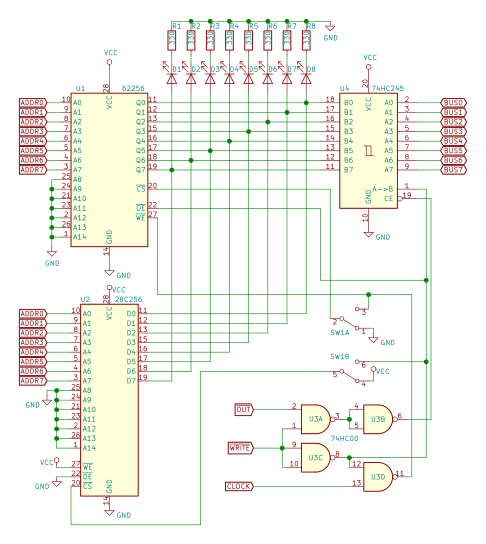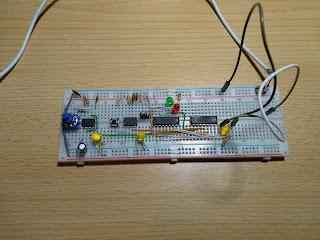8-bit CPU: Intro
The combination of COVID-19 lockdowns and quite unpleasant weather has forced me to spend much more time indoors and online. So, I stumbled on Ben Eater's web site. He builds various interesting things on breadboards, shoots videos of the process and is very good at explaining what he does.
I've always wanted to know how a CPU works. I have pretty good idea how higher-level programming languages translates to machine code. Also I knew about logic gates, and that you can combine them together into higher level constructs as latches, adders, counters and whatnot. But it still remained mystery to me how all that works together.
After watching the series about building an 8-bit computer, it became much clearer to me. But also I was hooked. Literally couldn't sleep for 2 nights straight, head full of ideas of modifications and experiments. But first I need to build one. I could have ordered a kit, but I'm feeling more like trying to do things on my own, using Ben's videos more like a guidelines.
Also I'm not that crazy about building the whole thing on breadboards. On contrary, I want it to be on PCBs eventually. Of course, designing and building single big PCB takes away all the flexibility. My intentions is to build a module on breadboard, test it, and then design a PCB for it.
There are like 5 almost identical register modules which is best replicated as complete boards. Then there is a register with additional features (increment contents), and I already have ideas where I can use more of these. It's OK to build them once, but I'm not particularly happy to start a production line. Soldering parts onto boards also takes time, but there's much lower risk of mis-wiring something (assuming that there are no errors in board's design, of course).
Finally, there are parts where the real fun happens, Control Logic for example, which may remain on breadboards for a long time, because it only makes sense to build a PCB for "final version".
But first things first: created a GitHub project for it, started on overall design and decide what parts I need to order and what I already have.
I've always wanted to know how a CPU works. I have pretty good idea how higher-level programming languages translates to machine code. Also I knew about logic gates, and that you can combine them together into higher level constructs as latches, adders, counters and whatnot. But it still remained mystery to me how all that works together.
After watching the series about building an 8-bit computer, it became much clearer to me. But also I was hooked. Literally couldn't sleep for 2 nights straight, head full of ideas of modifications and experiments. But first I need to build one. I could have ordered a kit, but I'm feeling more like trying to do things on my own, using Ben's videos more like a guidelines.
Also I'm not that crazy about building the whole thing on breadboards. On contrary, I want it to be on PCBs eventually. Of course, designing and building single big PCB takes away all the flexibility. My intentions is to build a module on breadboard, test it, and then design a PCB for it.
There are like 5 almost identical register modules which is best replicated as complete boards. Then there is a register with additional features (increment contents), and I already have ideas where I can use more of these. It's OK to build them once, but I'm not particularly happy to start a production line. Soldering parts onto boards also takes time, but there's much lower risk of mis-wiring something (assuming that there are no errors in board's design, of course).
Finally, there are parts where the real fun happens, Control Logic for example, which may remain on breadboards for a long time, because it only makes sense to build a PCB for "final version".
But first things first: created a GitHub project for it, started on overall design and decide what parts I need to order and what I already have.



Comments
Post a Comment